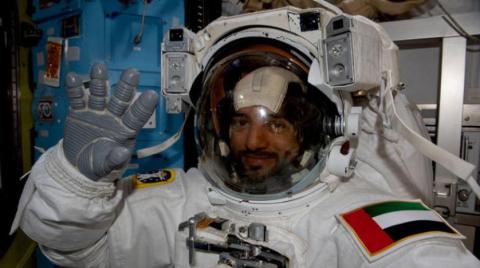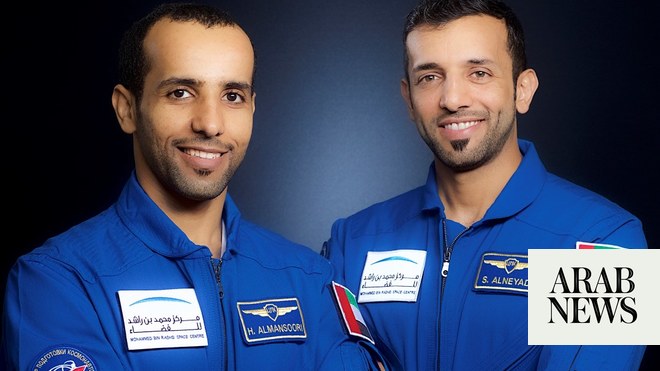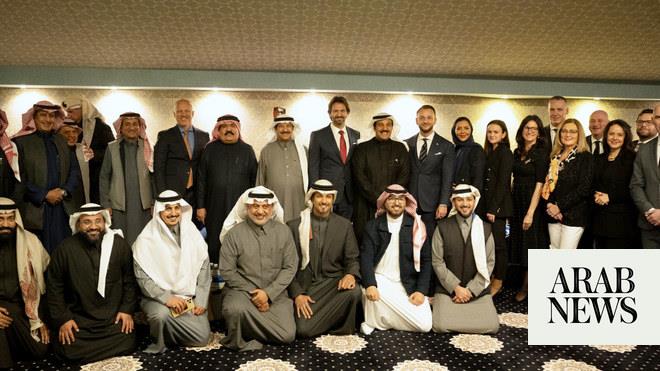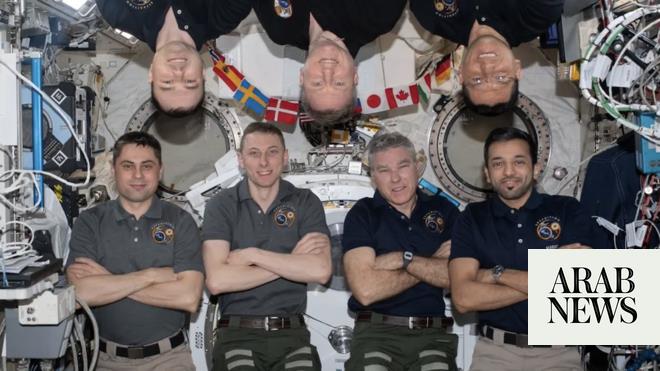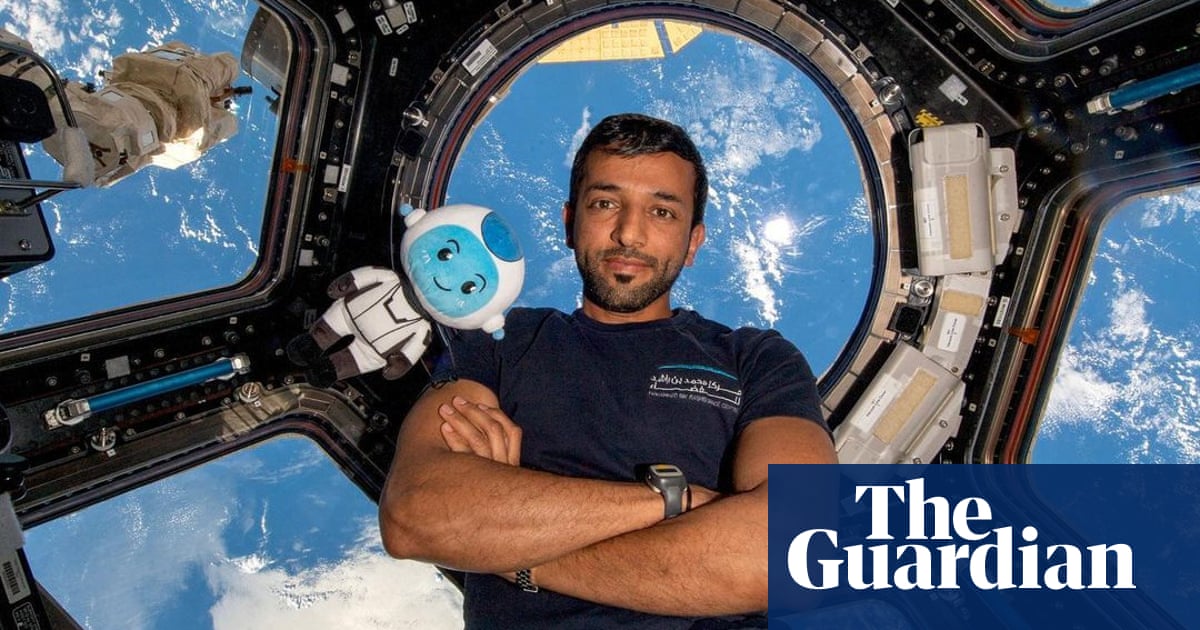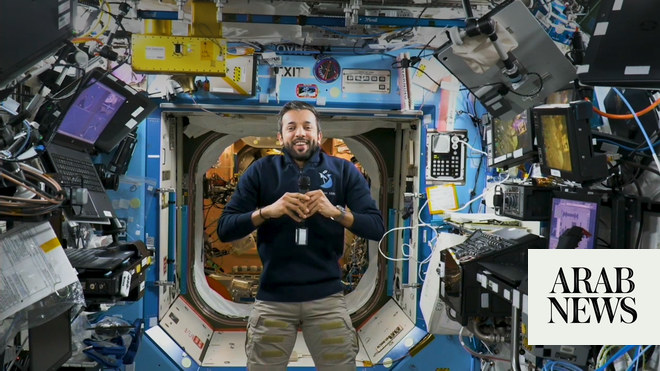
Pays tribute to Prince Sultan as Arab space pioneer, recalls “amazing” meet-up with Saudi astronauts Rayyanah Barnawi and Ali Alqarni on board the ISS
Highlights the importance of STEM subjects for preparing and inspiring the next generation of Arab astronauts
DUBAI: Manned missions launched by the UAE and Saudi Arabia signal “a new era in Arab space exploration,” Emirati astronaut Sultan AlNeyadi has told Arab News from the International Space Station.
As the first Arab astronaut deployed on a long-term space mission, having arrived on the ISS in March alongside three Americans and three Russians, and the first Arab to perform a spacewalk, AlNeyadi is blazing a trail for the Arab world’s budding space industry.
“Honestly, it’s a great honor to follow in the footsteps of the pioneers in space in the Arab world: Prince Sultan bin Salman, Muhammed Faris and my colleague, Hazzaa AlMansoori, who traveled to space before me,” he said during an interview conducted from the Mohammed Bin Rashid Space Centre in Dubai via video link with the ISS on Friday.
AlNeyadi was referring to Saudi Arabia’s Prince Sultan, who flew aboard the American STS-51-G Space Shuttle Discovery mission in 1985, becoming the first Arab in space; Faris, the first Syrian and the second Arab in space, traveling aboard the Soyuz TM-3 to the Mir space station in 1987; and AlMansoori, the first Emirati in space, spending eight days on board the ISS in 2019.
“It’s a great achievement for all of the missions, yet we need to look further into new challenges,” said AlNeyadi.
“The mission we are conducting now, it’s a pure example of that. Spending six months on board the station is really important to participate in the human effort to push the boundaries of space exploration.
“And the EVA (extravehicular activity) that I conducted, it’s the first of (its) kind from the Arab world and definitely, it will open the door for many astronauts to join.”
He added: “Definitely, it’s a new era. It’s a new time for space explorations from the Arab world.”
Saudi Arabia and the UAE have both been investing in their respective space industries, with a heavy emphasis on technology and medical research.
The Saudi Space Agency was launched four years ago by royal decree to accelerate economic diversification, enhance research and development, and raise private-sector participation in the global space industry.
Since its launch, the Kingdom’s state-funded space program has struck deals with several of the world’s established space agencies, astronautical companies, and top universities to further their cooperation.
On May 22, Rayyanah Barnawi, a scientist who became the first Saudi woman to go into space, and Ali Alqarni, a trained fighter pilot, traveled to the ISS on a private mission.
“What we saw when the Saudi astronauts arrived from Axiom 2 to the International Space Station, it was a great moment to meet with them and to exchange the interest of space,” AlNeyadi said, referring to the visit by Barnawi and Alqarni.
“It was, honestly, a kind of a surreal experience. Seeing two Arabs arriving at the station and … chatting with them in Arabic. It was amazing and, again, it was exciting to share the experience with them so far. I was already two months into the mission, and I was telling them everything that I learned and telling them the fun stuff that they can do.
“Their mission was purely scientific. I was happy to help and facilitate most of the activities on board. So, it was really a great honor and pleasure working with them.”
The UAE Astronaut Program was launched in 2017 by Sheikh Mohammed bin Rashid Al-Maktoum, the vice president and prime minister of the UAE, and Sheikh Mohammed bin Zayed Al-Nahyan, the then deputy supreme commander of the UAE Armed Forces and current UAE president.
AlNeyadi, who was the backup for AlMansoori in the UAE’s first scientific mission to the ISS, under the slogan “Zayed’s Ambition,” was selected for that mission from over 4,000 candidates following a series of mental and physical tests.
In preparation for the mission, AlNeyadi began his training in September 2018 at the Yuri Gagarin Cosmonaut Training Centre at Star City in Moscow. He also received training in Houston, Texas, and Cologne, Germany, as part of partnership agreements with major space agencies, including NASA, ESA and JAXA.
AlNeyadi underwent more than 90 courses exceeding 1,400 hours, including safety and survival training, how to maneuver in a spacesuit weighing up to 10 kg, and daily tasks such as preparing food in space, use of cameras, and communications.
His intense training has set him in good stead for the exciting, although completely alien, experience of living and working for a prolonged period of time in zero gravity, 260 miles above Earth’s surface.
“This is my favorite part of the day, actually, when I exercise. We have a device that we exercise upon and it’s facing the largest window on the station,” AlNeyadi told Arab News.
“I see everything passing in front of me: the mountains, the oceans, the places that I visited before.
“So, the best part is taking pictures of these places and sharing that with the audience and it’s amazing. You can cover the whole Earth and in 90 minutes you see the night and the day. And it’s surreal to see everything at that speed.”
Notwithstanding the breathtaking views of the blue marble below, a typical day aboard the ISS sounds more familiar than many might expect. “I normally wake up at 4 a.m. for my prayers and then I go back to sleep if I can,” said AlNeyadi.
FASTFACT
* The low-orbit International Space Station is a project involving five space agencies: NASA (US); Roscosmos (Russia); JAXA (Japan); ESA (Europe); and CSA (Canada).
“Otherwise, my final wake-up time is 6:30, when I go and have breakfast and then we gather together around the ATU (audio terminal unit), which is the communication device, and we get the brief from different control centers all over the globe.
“And then we’ll start the daily routine, be it space science or maintenance, or doing inventory. All of these activities are current, and we do this every day up until noon, when we gather for midday break and we have lunch and we chat about the daily activities as well. We continue until 7:30, (when) we gather for the final debrief of the day.
“This is a daily routine that we have. We have specific days when we receive visiting vehicles or (conduct) extravehicular activities, and that would be the activity throughout the day. And we do have weekends where we gather as a whole, the seven crew members, and we watch movies and we have meals together. So, it’s always fun.”
Serving aboard the ISS is not without its challenges, however. Far from his loved ones, AlNeyadi is looking forward to some home comforts upon his return to Earth later this year. “I do miss my family. I want to meet them first,” the father-of-six told Arab News.
“Two things I want to have are a hot shower and then a real cup of coffee.”
One thing that will stick with AlNeyadi for the rest of his life, however, is the day he became the first Arab to conduct a spacewalk — stepping clear of the ISS with nothing but mile after mile of sky beneath his feet and the eternity of outer space above his head.
“It was amazing, actually, conducting the spacewalk itself,” said AlNeyadi. “It’s, I would say, the crown jewel of the mission itself. It was seven hours. I didn’t feel it because I was really focused on the task and conducted the task with no issues.
“I remember taking a small note on my cuff checklist — a reminder to me — ‘Impossible is possible,’ which is the motto of the UAE government, that we have nothing impossible. If we believe in a target, we work hard for it, we can achieve it.”
AlNeyadi was born on May 23, 1981, in Umm Ghafa, 30 km southeast of Al-Ain, in Abu Dhabi, where he attended primary and secondary school before following in his father’s footsteps to serve in the military, where he studied communications engineering.
He began his higher education in the UK, receiving a bachelor’s degree in electronics and communications engineering from the University of Brighton, before receiving a master’s degree in IT from Australia’s Griffith University in 2008, where he later earned a Ph.D.
In a series of videos produced on board the ISS for students back on Earth, AlNeyadi has sought to highlight the importance of hard work and the relevance of STEM subjects.
“I think part of the mission itself is to reach (out) to the audience and to showcase whatever you’re doing on board the station,” AlNeyadi said of his videos.
“It is very important science, very important technology that we showcase. But we need to show this important stuff in an easy way and an interactive way so people can learn.
“And this is, honestly, a way to encourage the younger students to seek STEM education. That is science, technology, engineering and mathematics.”
In doing so, AlNeyadi hopes to inspire the next generation of Arab astronauts who will take the Middle East’s nascent space programs to the moon, to Mars, and beyond.
“When we talk about STEM education, this can open up a whole lot of opportunities for the youngsters,” he said.
“So, in a fun and interactive way, I wanted to show this — the science is fun, the science is really cool — so the newer generation can think of something important in the future.”




